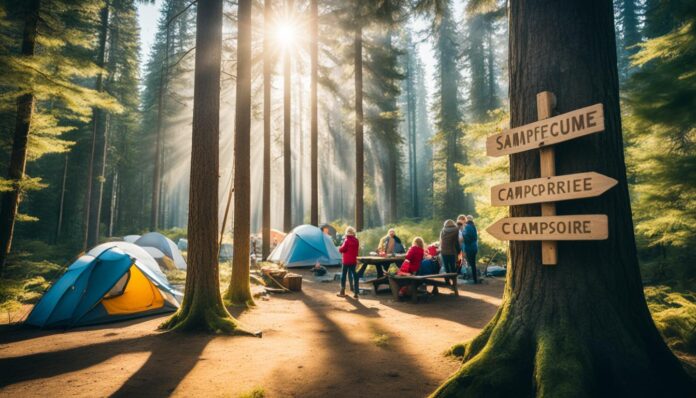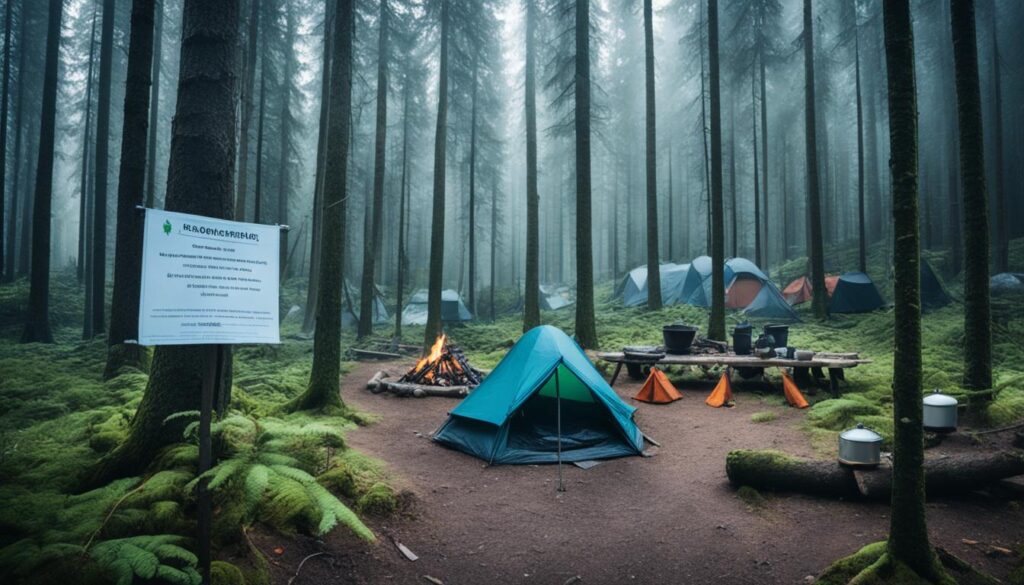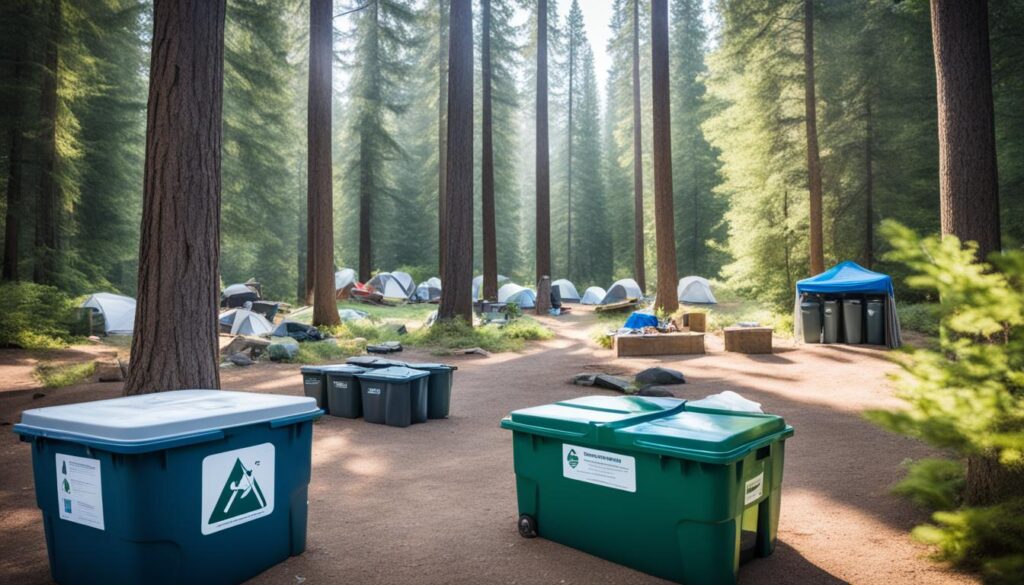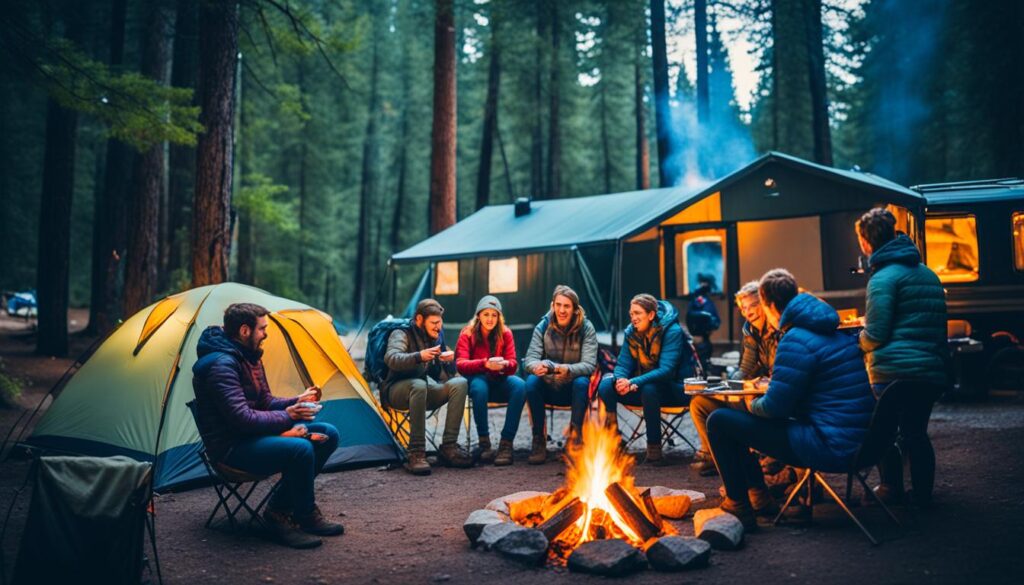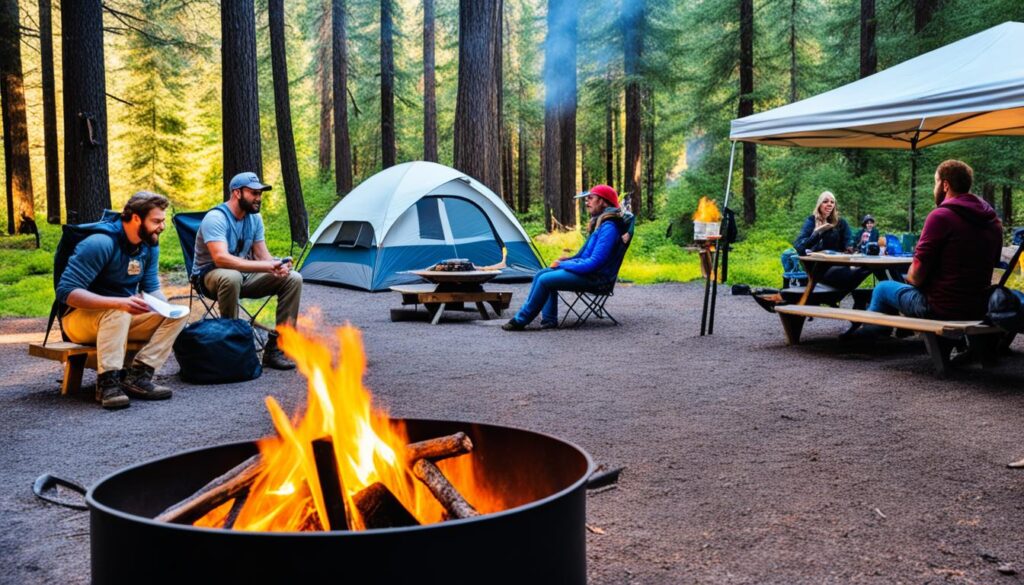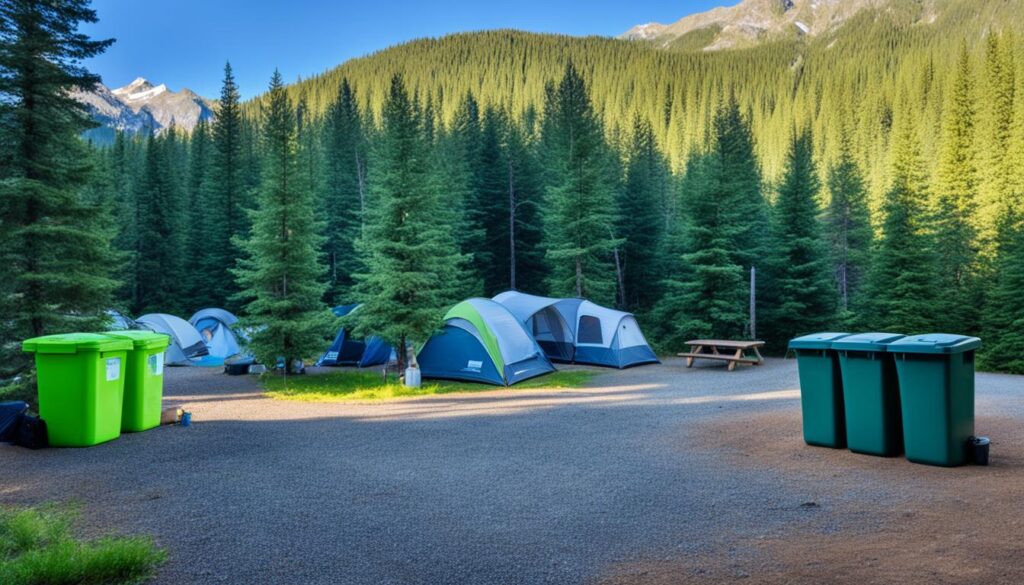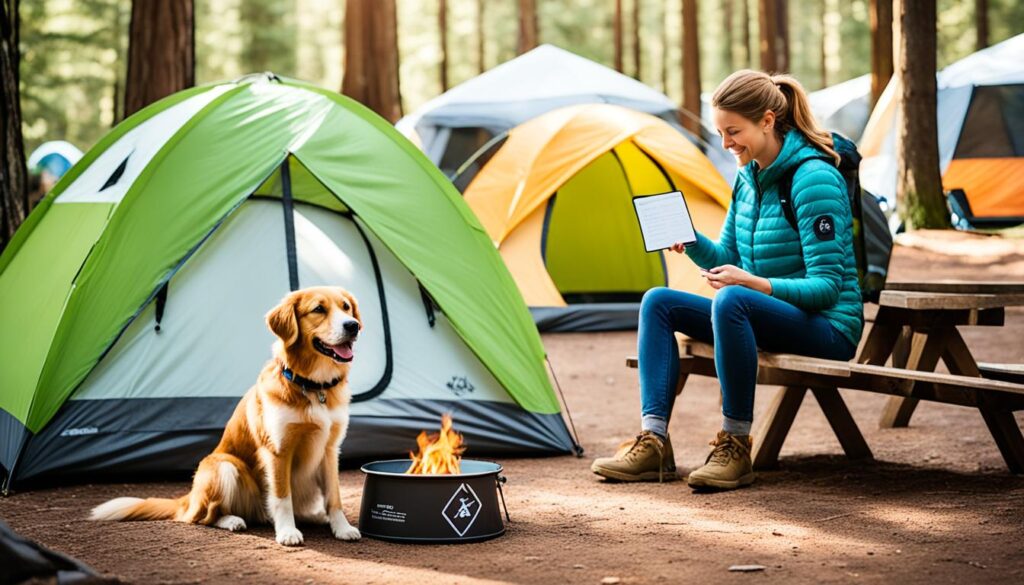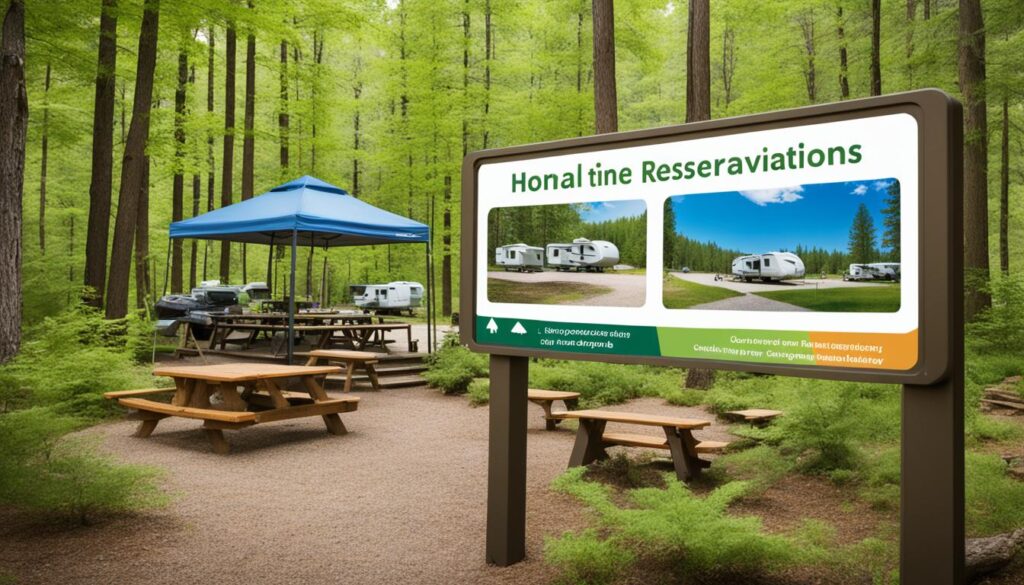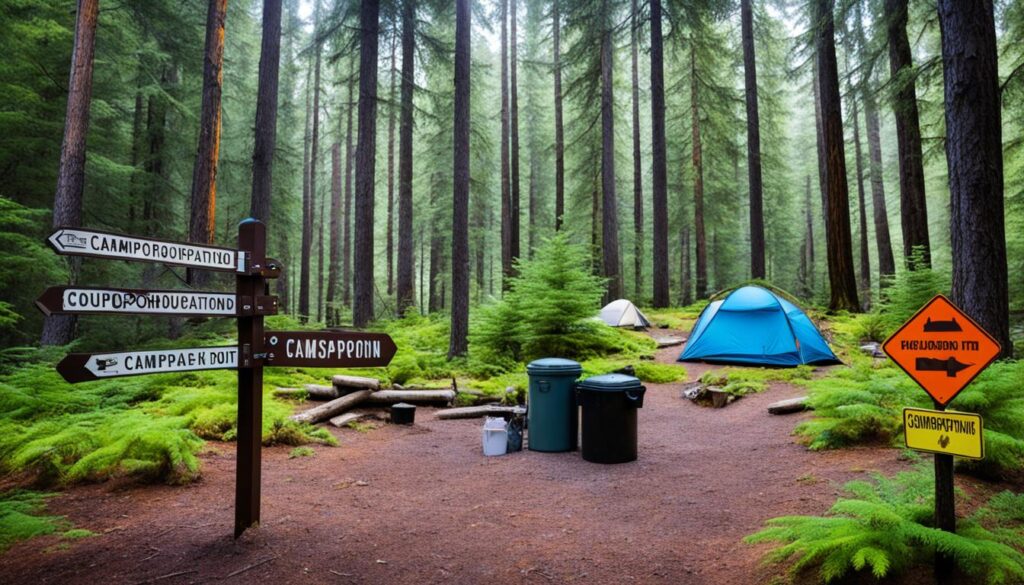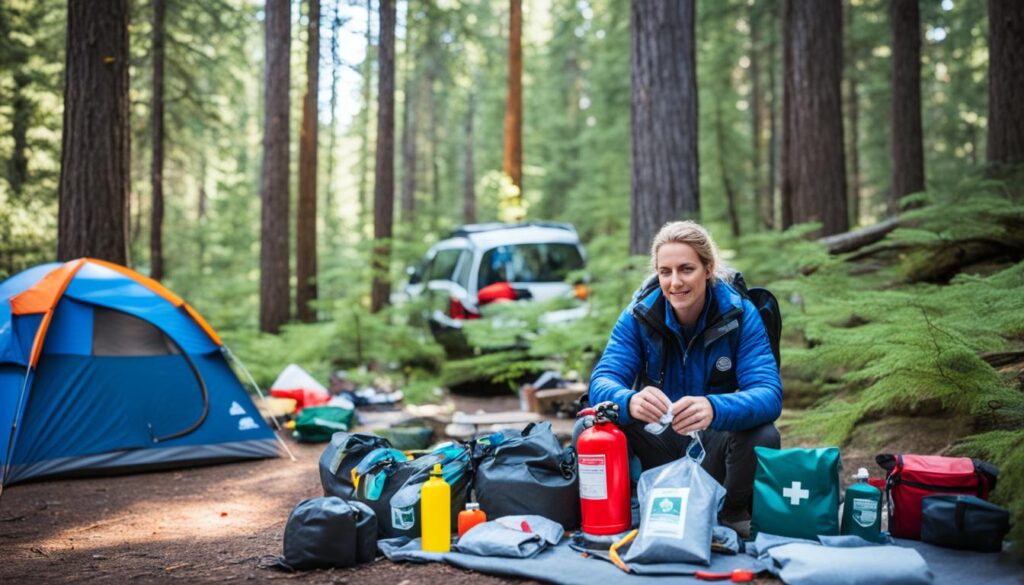Welcome to the great outdoors! Your camping adventure starts here. Are you curious about campground rules?
Do they limit your fun or have a bigger reason? Let’s find out why following them matters for everyone’s peace.
Why Campground Rules Matter
Before you go camping, getting to know the site’s rules is key. These camping protocols keep everyone safe and happy. They also help look after the nature reserve rules and keep the campsite’s natural beauty.
These rules touch on fire safety, noise regulations, waste disposal guidelines, and recreational activities. Following them makes the campground a better place for all. It makes your camping trip more enjoyable too.
“Following campground rules makes the place welcoming. It shows we care about the environment and others,” says Sarah Thompson, who loves camping.
It’s especially crucial to follow camping protocols in nature reserves. Here, preserving the ecosystem and wildlife is a big deal. Nature reserves have strict nature reserve rules for a good reason. They protect endangered species and minimize our impact.
By sticking to these rules, we help keep these areas beautiful for the future. Respecting the environment is a duty we all have. It’s important both in and out of the campground.
Next, we’ll look at how to be a thoughtful camper. This will help everyone have a great time camping.
Essential Campground Etiquette
When you’re out in the great outdoors, remember, you’re not alone. You’re sharing the space with other nature lovers. It’s important to practice good manners. This shows respect for others and helps keep the area beautiful and peaceful. Here are some key rules to follow:
1. Keep Noise Levels in Check
Be mindful of how loud you are. Keep your talking and music at a low volume. This way, you won’t bother other campers. The quiet of the outdoors is what many people come here for.
2. Respect Quiet Hours
Many campgrounds have quiet hours, usually at night and early morning. Keep noise down during these times. This helps everyone get a good night’s sleep.
3. Follow Leave No Trace Principles
Leave No Trace means being careful about how you interact with nature. Throw away your trash, leave plants and animals alone, and keep the wilderness wild. Following these rules means you’re doing your part to protect nature for the future.
“Take only pictures, leave only footprints.”
4. Be Mindful of Campsite Boundaries
It’s important to respect everyone’s space. Don’t set up your tent too close to others. Respect the campground’s space rules. This helps everyone feel comfortable and ensures privacy.
5. Control Your Pets
If you bring pets, follow the campground’s rules for them. Keep them on a leash, clean up after them, and be considerate of people who might be afraid or allergic. Responsible pet ownership makes camping fun for everyone.
6. Leave Nature as You Found It
Don’t pick flowers or bother the wildlife. Leave the campground as beautiful as when you arrived. This way, others can enjoy it too. By not disturbing nature, you help protect the environment.
7. Be Considerate with Campfires
If you make a campfire, do it safely. Only have fires in allowed areas and follow all the rules. Keep the fire small, never leave it alone, and put it out completely when done. This keeps everyone and the forest safe.
8. Practice Cleanliness
Keeping your campsite clean is part of being a good camper. Use the right bins for trash and recycling. A tidy campsite is better for everyone and helps prevent animals from getting into your things.
9. Be Friendly and Considerate
Being nice and respectful to other campers is basic but important. Say hello, respect their space, and be kind. Creating a friendly community at the campground makes the trip better for everyone.
By sticking to these outdoor etiquette rules, you make camping great for you and others. Let’s all do our part to keep nature pristine and enjoyable.
Noise and Quiet Hours Guidelines
When staying at a campground, keeping noise levels low is key. This respects the campground’s quiet hours. Doing this makes sure everyone has a nice time camping.
Quiet hours mean times when you should be extra quiet. This helps everyone get some rest and relax. These hours often begin in the evening and end in the early morning. Check what those hours are at your campground.
Avoid making too much noise during quiet hours. This means no loud talks, music, or using noisy things. Sound travels far outdoors, so always be mindful.
Plan to hang out at your own campsite to limit noise. Stay away from common areas when it’s quiet time. This keeps the campground peaceful for those trying to sleep.
Noise Reduction Tips
Here’s how to stay quiet:
- Use headphones at low volume for music or videos.
- Speak softly and don’t shout.
- Shut car doors gently without revving engines for no reason.
- If you must use generators, do so rarely and only when it’s allowed.
Stick to these tips and honor quiet hours to help everyone enjoy their nature stay.
Campfire Safety and Regulations
Enjoying a campfire while camping is great, but safety is key. It’s vital to follow the campsite’s fire rules. Doing so protects you, others, and nature itself.
Understanding Campfire Regulations
Campfires bring warmth and a cozy vibe. Yet, they require careful handling. Campgrounds set campfire rules to avoid accidents and protect nature.
Always check the campsite’s fire rules before starting a campfire. These may cover where to light fires, gathering firewood, and fire starter use.
Fire Safety Tips
For a safe, enjoyable campfire, here are some important tips:
- Pick a campfire spot far from flammable items like trees and tents.
- Make sure the area around your fire pit is clear, at least 6 feet in all directions.
- Always have water or a fire extinguisher ready for putting out the fire.
- Never leave your fire unattended. Always put it out completely before leaving or sleeping.
- Use firewood from the local area to avoid spreading invasive species.
“A campfire can create lasting memories, but always prioritize safety and respect campground guidelines. This way, you enjoy the campfire’s warmth while protecting nature.”
By adhering to these guidelines and practicing fire safety, you’re ensuring a safe campfire experience. Enjoying nature also means taking care to preserve it for the future.
Waste Disposal and Leave No Trace Principles
Maintaining clean campgrounds and preserving nature are key. This calls for proper waste disposal. It’s about keeping our outdoor spaces beautiful. By sticking to Leave No Trace principles, we reduce our environmental footprint. This makes camping sustainable.
Leave No Trace Principles
The Leave No Trace principles guide campers to lessen their environmental impact. This helps protect nature for others to enjoy.
- Plan ahead and prepare: Properly planning helps reduce waste and unnecessary consumption.
- Dispose of waste properly: Follow the rules for waste disposal. Use designated bins for trash and recyclables.
- Leave what you find: Don’t disturb natural objects, wildlife, or historical artifacts.
- Respect wildlife: Watch wildlife from a distance. Never feed or disturb them.
- Minimize campfire impact: Use fire rings for campfires. Always put them out completely.
- Be considerate of other visitors: Keep quiet and respect others’ space.
- Leave the camping area better than you found it: Pick up trash, and join in cleanup efforts.
By following these guidelines, we support a clean environment. We also protect the wildlife and natural places we enjoy when camping.
Proper Waste Disposal Methods
Adhering to campground waste guidelines is critical. Proper disposal keeps our surroundings clean and wildlife safe. Here are essential waste disposal methods:
- Separate recyclables: Use recycling bins for plastics, cans, and paper.
- Bag and tie trash: Secure garbage bags to prevent litter.
- Use composting toilets: They’re an eco-friendly alternative. Follow their usage instructions.
- Dispose of hazardous waste responsibly: Consult with staff for safe disposal tips.
Properly disposing of waste keeps campgrounds clean. It also protects wildlife and ecosystems.
By practicing good waste disposal and following Leave No Trace, we ensure enjoyable, environmentally-friendly camping. This preserves the beauty of our campgrounds and nature reserves.
Pet Policies and Considerations
Bringing your furry friends on a camping trip can be fun for you and your pet. But, you should check the pet policies and considerations of the campground. This ensures everyone has a good time.
Each campground has its own rules about pets. Some allow pets on leashes in certain areas. Others might offer pet-friendly sites or cabins. Before you book, make sure you know the campground’s pet rules.
Being a responsible pet owner is key to keeping the campground safe and fun. To make your and other campers’ experience positive, here are some tips:
- Keep your pet on a leash at all times, unless in designated off-leash areas.
- Always clean up after your pet and dispose of waste properly.
- Respect quiet hours and ensure your pet does not disturb other campers.
- Be mindful of local wildlife and ensure your pet does not disturb or harm any animals.
- Keep your pet’s vaccinations up-to-date and carry proof of vaccination.
Not everyone is comfortable around pets or may have allergies. So, being considerate is important. Always watch your surroundings to make sure your pet behaves and is controlled.
Reservation and Check-In Procedures
Planning a camping trip means knowing how to book and check in. Understanding these steps makes your arrival smooth. You won’t face any surprises, and your campsite will be ready.
Book your campsite early. Many campsites fill up quickly, especially in the busy season. Look at the campground’s website or call the office for reservation details and rules.
Provide all the info they ask for when you book. This includes your stay dates, how many people are coming, and any special needs. Correct information helps the staff prepare the right spot for you.
Check-in at the campground when you get there. Show your booking confirmation and ID. The staff might give you a map of the place, pointing out facilities and your campsite.
Learn the rules and regulations during check-in. They keep everyone safe and happy. Look out for rules on noise, fires, trash, and pets.
By following these steps, you ensure a great camping trip. It also helps the staff manage the campground better, making everyone’s stay enjoyable.
| Reservation and Check-in Tips: |
|---|
| 1. Make a reservation in advance to secure your preferred campsite. |
| 2. Provide accurate information during the reservation process. |
| 3. Prepare your reservation confirmation and identification for check-in. |
| 4. Familiarize yourself with the campground’s rules and regulations. |
| 5. Follow any specific guidelines provided by the campground staff. |
Recreational Activities and Guidelines
When camping, you’ll find lots of fun activities in beautiful settings. Enjoy hiking, fishing, or boating. But remember to follow the camping regulations. These rules help keep everyone safe and happy.
To have fun responsibly, know the park’s rules. For hiking, stick to marked trails. This protects plants and animals and keeps you safe.
Fishing has its own rules, like needing a permit and catch and release policies. Following these helps keep fish populations healthy for everyone.
If boating is your choice, check the rules on boat sizes and speed. Know where you can boat safely. This prevents accidents and makes sure everyone has a good time.
Respecting camping regulations keeps the great outdoors beautiful. It also ensures these places can be enjoyed by others in the future. So, hit the trails, fish with care, and boat safely, all while following the rules that protect our natural spaces.
Safety Measures and Emergency Preparedness
When you camp in a campground, knowing the safety measures and being ready for emergencies is key. This keeps you and others safe while enjoying the outdoors. Follow the campground’s safety rules and regulations for a carefree camping trip.
Understanding Emergency Protocols
Learn the campground’s emergency protocols before setting up. These include evacuation steps, meeting points, and how to communicate. Being familiar with these can help you act quickly if something unexpected happens.
First Aid and Medical Assistance
Accidents can occur at campgrounds. Have a first aid kit with bandages, antiseptics, painkillers, and required prescription medicines. Know where the closest medical facilities and emergency numbers are to get help fast if needed.
Fire Safety
Campfires add to the camping fun, but you must follow the rules for fire safety. Keep fires in designated areas, far from anything that could catch fire. Always have water or a fire extinguisher handy, and put out the fire completely when done. Fire safety protects the environment and reduces wildfire risks.
Navigation and Trail Safety
Be aware of your surroundings and stay on marked paths while exploring trails and outdoor areas. Use a map, compass, or GPS for safe navigation, especially in unknown spots. Tell someone your plans and when you’ll return. If you face dangers or get lost, stay calm and seek help correctly.
Weather Preparedness
The weather can change quickly, so be prepared. Check the forecast before your trip and pack for various weather conditions. Know how to avoid lightning and where to find shelter during bad storms. Learn the campground’s protocols for weather to stay safe.
Respecting Wildlife
Seeing wildlife is thrilling, but keep a safe distance and respect their homes. Never approach or feed wild animals, as it’s risky for you and them. Follow the campground’s wildlife guidelines to live peacefully alongside nature.
By adhering to these safety guidelines and preparing for emergencies, you can thoroughly enjoy camping. Safety rules and regulations are there to protect you, others, and nature. Let’s keep the great outdoors beautiful and safe for all.
Conclusion
It’s key to follow campground rules for a good camping time. When you stick to the rules, you’re helping everyone. You keep the site beautiful and peaceful for all.
Keeping noise down makes sure everyone can enjoy the quiet. Being safe with campfires stops dangers and protects nature. This way, we prevent harm to the campsite and its surroundings.
Throwing away trash right and following Leave No Trace keeps the site clean. If you bring pets, make sure you know the pet rules. This makes camping fun and safe for everyone.
Knowing how to check in and book your spot makes things smoother. It’s also important to know how to stay safe. Knowing about safety and what to do in emergencies keeps you ready.




























